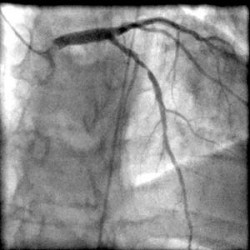Medical | National News
WU researchers find genetic link between coronary artery disease and patients with diabetes
An example of a coronary angiogram, the imaging method used to assess the severity of coronary artery disease in patients enrolled in the BARI 2D clinical trial.
Researchers found that in Caucasian patients, a variation in one particular gene—the TLL1 gene—was associated with the severity of patients’ coronary artery disease.
The findings were published in the September issue of Circulation, a journal for cardiologists published by the American Heart Association.
Coronary artery disease is the main cause of death for patients with Type 2 diabetes.
“[It’s] something that we see very commonly,” said Dr. Sharon Cresci, assistant professor of medicine and one of the authors of the research paper. “It’s a more high-risk patient population that we’re aware of and would like to be able to have better ways of treating.”
Coronary artery disease progresses especially quickly in patients with Type 2 diabetes. In addition, patients’ symptoms are less obvious and harder to diagnose.
According to estimates from the Center for Disease Control and Prevention, nearly 26 million people in the US are affected by diabetes. Scientists believe that Type 2 diabetes, the more common type, is caused by a combination of genetic and environmental risk factors.
Cresci said that she has received several emails about the publication, and she expects more academic cardiologists and clinicians to read it in the future.
The sample for the study was composed of 1043 patients of mixed races. The participants were selected for having moderate forms of coronary artery disease as determined by looking at their documented lesions.
Blood, DNA samples and lab data for the experiment were collected at multiple research sites around the country, including at the University.
Researchers found that the presence of the variant in the TLL1 gene more accurately predicted the extent of a patient’s coronary artery disease than any other clinical factor, including body mass index, age, smoking dependency and blood pressure.
Two independent, outside sources validated the finding: the prospective Family Heart Study of individuals at risk for coronary artery disease and a post-myocardial infarction registry from the Translational Research Investigating Underlying Disparities in Acute Myocardial Infarction Patients’ Health Status.
Cresci said that while the gene could likely become a target for therapeutic interventions based on genotype, it is difficult to know how the discovery will ultimately affect clinical work.
“It’s very difficult to say where research will go clinically—I think that’s one of the more exciting aspects of it; you make a fundamental discovery, and other people build on those discoveries. It’s just very exciting.”

